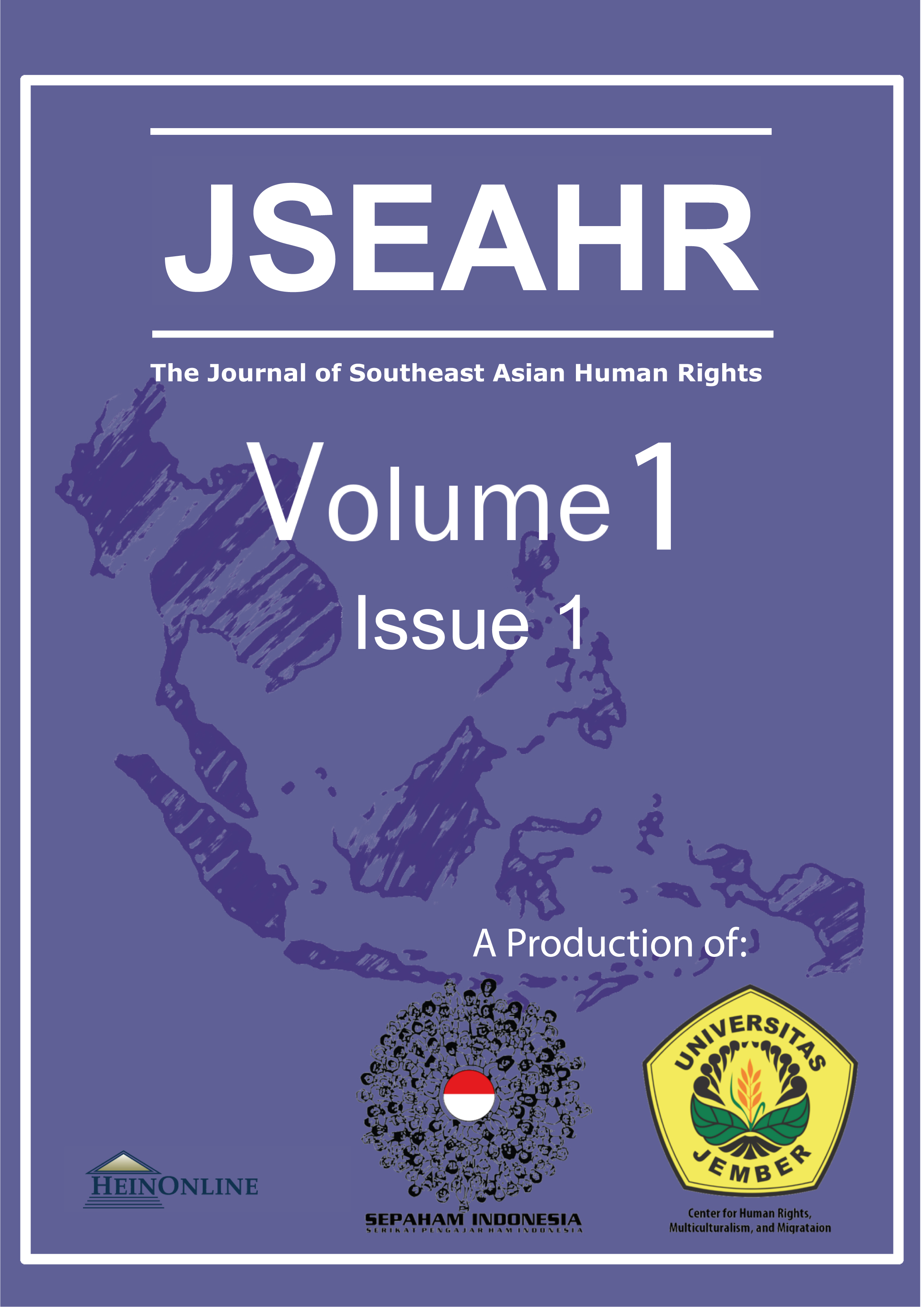Can Human Rights and Indigenous Spirituality Prevail over State-Corporatism? A Narrative of Ecological and Cultural Rights Violation from East Kalimantan, Indonesia
An Activist Perspective
DOI:
https://doi.org/10.19184/jseahr.v1i1.5282Abstract
This article examines both theoretical and empirical discussion on strategies to overcome state-corporatism and developmentalism practices in East Kalimantan, Indonesia. State-corporatism is the term used to describe a political condition when a state has a strong linkage to organized groups. Developmentalism is an over-arching concept to describe a strong tendency of a state to maximize economics growths through investment, while disregarding people’s fundamental rights. East Kalimantan Province is selected because it is highly known as one of the enournous amount of natural resources found within among other provinces in Indonesia. However, the richness of this province has become a curse of its people due to massive destructions of natural resources. This paper seeks to analyse in what way human rights’ principles and indigenous spirituality can lessen the negative effects of ‘development’ projects sustained by state-corporatism. This article contemplates what strategies that can be executed to diminish state-corporatism effects in East Kalimantan, particularly in two important districts: Regency of Kutai Kartanegara and Bontang Municipality. This article argues that the indigenous spirituality is a key to battle state-corporatism’s influences. Indigenous spirituality as forum internum is still a potential tool of advocacy. By capitalizing the role of shamans, indigenous peoples might still have opportunities to reclaim and defend their cultural rights.
Downloads
References
Crook, R and James Manor, Democracy and Decentralization in South Asia and West Asia (Cambridge: Cambridge University Press, 1998).
Funchs, Doris, Lederer and Markus ML, et al, “The Power of Business†(2007) 9(3) Business and Politics.
Grossmann, H, Hukum Akumulasi dan Keruntuhan Sistem Kapitalisme, (Jakarta: Hasta Mitra-YSIK, 2001).
Hager, M, The Role of Lawyers in Developing Countries, Journal: Law and the Developing Countries, Texas Austin.
Johnson, G, The Contribution of Eleanor and Franklin Roosevelt to the Development of International Protection for Human Rights, Human Rights Quarterly 9.
Mendelson, W, Law and Development of Nations, The Journal of Politic, Vol 32, The University of Texas Austin, (1972).
Ohkawa, K and Henry Rosovky, A Century of Japanese Economic Growth, in a State and Economic Enterprise in Japan (Princeton University Press, 1985).
Pichard, M and Robert E. Wood, Tourism, Ethnicity and the State in Asian and Pacific Societies (Honolulu: Hawai’i University Presss, 1997).
Pichard, M, “Cultural Tourism†in Bali: Cultural Performances as Tourist Atraction, Indonesia, 49 (April, 1990).
Pistor, K and Philip A. Wellons, The Role of Law and Legal Institution in Asian Economic Development 1960-1995, Oxford University Press, 1998.
Relschauer, E.O, History of Japan, 3rd edition, Knopf, New York.
Ribot, J, Waiting for Democracy: The Politics of Choice in Natural Resource Decentralization (World Resource Institute, 2004).
Sengupta, A, Right to Development as a Human Right, Economic and Political Weekly, Juli 7, 2001.
Spencer, H, The Men versus the State: With Six Essays on Government, Society and Freedom, Liberty Classic, 1884.
Umozurike, O, Human Rights and Development, UNESCO (1998).
Vidyattama, Y, Hares and Tortoises: Indonesia’s Regional Development Kaleidoscope (Presentation to the ANU Indonesia Update, September 20, 2013).
Weiss, L, The Limit of Powerless State, (Cornell: Cornell University Press, 1998).
Wolman, H, Decentralization: what it is and why we should care in Bennett RJ (ed), Decentralization, Local Government, and Market: Toward A Post-War Welfare Agenda (Oxford: Clarendon, 1990).







